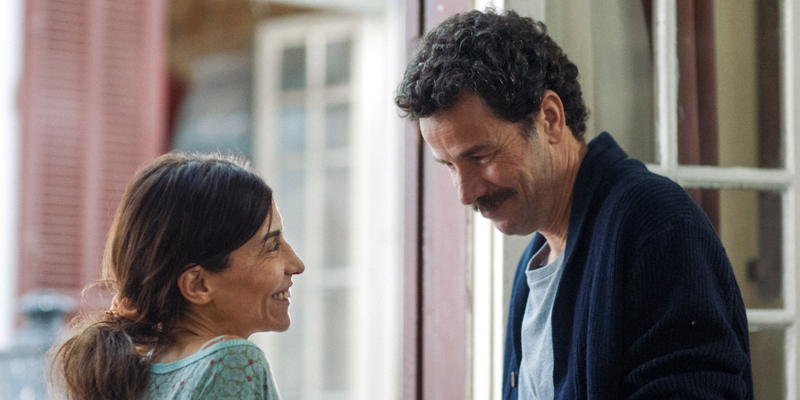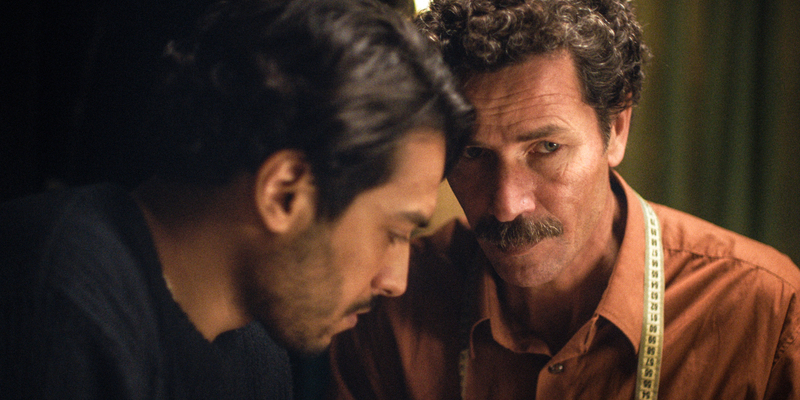
Review by
Benjamin Poole
Directed by: Maryam Touzani
Starring: Lubna Azabal, Saleh Bakri, Ayoub Massioui

Tricky thing to capture texture and tactile sensation on film, I reckon.
Notwithstanding gimmicks like John Waters' (now there's a well-dressed
man) Odorama, sight and sound are the primary lexicons of cinema. Unless
an exhibitor organises a buffet and a correspondingly byzantine method of
synchronising ingestion, taste is out of the picture(s) too, which leaves
touch. Within the realm of the cinematic senses, touch is perhaps the
facility most tantalisingly implied: we see the softness of satin, the
heat of flame, the depth of water, but we don't feel them. Is the key to
pornography's addictive dissatisfactions the suggestion of physicality
located within the inexorable impossibility of consummation? The promise
of fleshly delights never fully delivered...

True to theme,
Maryam Touzani's The Blue Caftan opens with a close
up montage of softly peaked lapis. We could be looking at an alien
landscape, a territory of deep blue exoticism, a rolling panorama of
luxury. However, transitions to golden thread, a yellow ribbon of
measuring tape, the concerned eye of a tailor, communicate that the
screen-filling cobalt is the silk which will eventually form the eponymous
title garment. We long to touch it.
The Blue Caftan is a film predicated upon carefully
constructed presentations, and the importance of how we appear to others.
Halim (Saleh Bakri) is a tailor in Rabat, who works the shop with
his wife Mina (Lubna Azabal). Age has come for both, along with
other unwelcome eventualities, and so Halim has taken on a keen and
talented apprentice Youssef (Ayoub Missioui) to share the load.
Only snag is that Halim is a partially closeted homosexual, while Youssef
is an obscenely beautiful man. It's hard not to stare, and Mina certainly
notices Halim's eyes wandering to this pulchritudinous young buck who, not
meaning to stereotype, being a man so enthused by the concept of clothes
and female fashion, is most likely in the gays, too. Cue lingering
glances, barely suppressed need, and a febrile atmosphere where urgent
undercurrents (desire, jealousy, terror) are played out in discreetly
masked modes of repression.

The situation is heightened by the draconian policy of Morocco to its
LGBTQ+ community, where being gay is illegal and can be punished with
"anything from three to five years' imprisonment and a fine of 1,200
dirhams." In 2016 a couple of girls were photographed having a little kiss
and were actually imprisoned for it. Worse still, they were grassed up by
one of the kids' own mothers. It's not normal there. Nonetheless, Halim
finds solace in the back street saunas of the city, and furtive encounters
in bathrooms. He confides to Mina of his father's disapproval of him, and
Touzani makes clear the cultural implications which have led to him
marrying Mina. While for the sauna lads it's sly consensual fun, you get
the impression that Halim wouldn't have chosen this sort of life: he's a
quiet man of delicate tastes. Such as the electric, and increasingly
frequent, touch of Youseff, which is like a needle and thread through his
heart.
The ultimate complication, however, is Halim's love for Mina. Although not
a sexual love, the affection he has for her, the companionship, is deep
and abiding. Love, as ever, is mercurial and no one thing. We learn early
on that Mina is very ill, and subsequently as Halim tends to his wife
Youseff becomes a hope for the future, along with cause of shame: a source
of guilt for Halim even entertaining the thought of a life past Mina. It's
complicated, as every human relationship beyond blood relation should be.
Best to channel heartbreak into the intricate embroidery of frills upon a
dress and the Sisyphean task of completing the caftan, which acts as a
gentle metaphor for Halim's dignity and necessary deception.

For someone obsessed with clothes, and appearances, and what other people
are wearing, The Blue Caftan is a delight: the exquisite
close ups of brocade, the long takes of needlepoint and the accepted sense
that clothes matter and matter deeply, either as an extension of character
or necessary disguise, meant that this unapologetic fashionista was a
captive audience. Moreover, though, such visual pleasures are woven into
the rich dramatic fabric of a film which wears its heart-breaking
implications lightly, and to devastating effect. Touzani deftly avoids
melodrama and refuses to sensationalise the shifty sexuality of Halim's
other life. Instead, à la mode, The Blue Caftan balances the
devastating effects of prejudice against the redemptive succour of love.

The Blue Caftan is in UK/ROI
cinemas and on BFI Player and Curzon Home Cinema from May 5th.

